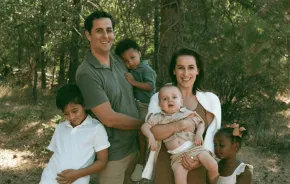 Debra Harrell's arrest for leaving her 9-year-old in a park while working, among other reports of children being left in unsupervised situations, sparked a national debate: Should a mother be arrested and her child taken away for practices we remember as common in decades past?
Debra Harrell's arrest for leaving her 9-year-old in a park while working, among other reports of children being left in unsupervised situations, sparked a national debate: Should a mother be arrested and her child taken away for practices we remember as common in decades past?
According to a recent poll from Reason-Rupe, the majority of U.S. citizens have opinions that support these arrests. An astounding 68 percent of Americans believe the law should require supervision of 9-year-olds and younger at the park. When asked what age a child should be allowed to wait in a car on a cool day for five minutes, the average answer given was 11. The average age given was still 11 even when asked what age a child should be allowed to play in front of their own home.
Does it depend on the neighborhood?
While the majority agreed regardless of demographic, there was a striking difference in opinion between the rich and the poor in the question of the 9-year-old playing at the park. The higher the income and education level, the more likely respondents were to say it's legally okay for kids to roam free. Among the wealthiest, only 54 percent thought supervision should be required by law for 9-year-olds, versus 79 percent of the poorest respondents. Even up to age 12, over half of the poorest survey responders agreed that supervision at parks should be required by law.
Similarly, the more wealthy and educated respondents were, the more likely they were to say that politicians and the media are overestimating the level of threat that exists for children today, whereas the poorer and less educated were more likely to view the world as less safe than the media portrays.
A problem becomes apparent in poor neighborhoods: Not only are the poorest more likely to have child-care issues, but this survey shows that their peers are more likely to percieve any resulting lack of supervision as criminal neglect, as was the case for Debra Harrell as well as for Shanesha Taylor, a homeless mother who left her children in her car in order to attend a job interview.
Regardless of demographics, across all wealth and education levels, respondents agree that compared to when they grew up, kids face more physical threats today.
Helicopter vs. free-range parenting
This would suggest that "helicopter" parents (and the childless adults who agree with them) are operating out of a fear that the world is more dangerous than it used to be. In actuality, violent crime towards children has been decreasing since its peak in the mid-'90s. In 1994, the risk of serious violent crime towards children was 62 in 1,000. In 2010, it was 14 in 1,000.
However, even if the risk is less today, perhaps our eyes are more open. One commenter on Debra Harrell's story notes: "Although I walked blocks to school as early as grade 2, I was approached by a 'pervert.' So I am a helicopter parent because of my experience. " Knowing danger exists, should we err on the side of keeping our kids safe, if it could mean saving even one child out of a thousand?
From the perspective of "free-range" parents such as Lenore Skenazy (who also writes for Reason.com), over-protecting leads to greater problems, from hindering the free play that helps our children develop life skills to great societal ills such as the child obesity epidemic.
Moreover, parents face real consequences from "helicopter" bystanders and law enforcement, whom the poll indicates are in the majority. Debra Harrell temporarily lost custody and even got jail time for, as Skenazy puts it, "refus[ing] to indulge in inflated fears of abduction and insisting her daughter never leave her side." This summer, Nicole Gainey was charged with child neglect as a consequence of letting her 7-year-old walk to the park alone, and she had to pay nearly $4,000 to a bondsmen she quotes as saying "my parents would have been in jail every day."
Perhaps the bystander and officer who responded to Gainey's son prevented the child from a possible crime. Or perhaps, as one commenter put it: "If the park is unsafe, then that means the cops should be busy policing the area for criminals rather than arresting children’s parents."











